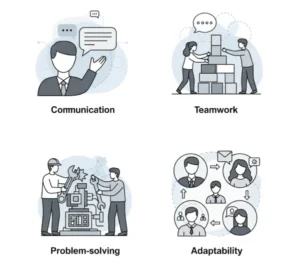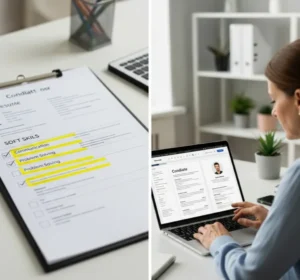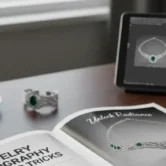
Effective Ways to Assess Soft Skills During Recruitment
Finding the right person for a job is more than just checking their resume. While skills and experience matter, it’s the way someone works with others, handles pressure, and communicates that can really make a difference. A great worker isn’t just someone who can complete tasks, but someone who can work well in a team and help build a positive workplace. These traits, often called soft skills during recruitment, are just as important as technical abilities. They may not be listed on a certificate, but they show up in how a person acts every day at work.
That’s why many employers are now focusing more on soft skills during recruitment like communication, teamwork and adaptability when choosing new team members. Soft skills can be hard to spot in an interview or on a resume, but they matter just as much as hard skills. You might see a long list of achievements and training, but that won’t tell you how someone solves problems, stays calm under stress, or talks to coworkers. Learning how to notice these qualities during hiring can help you find people who don’t just look good on paper but also work well in real situations.
In this guide, you’ll discover simple ways to spot interpersonal skills during recruitment and make smarter choices when hiring. Choosing the right person with the right attitude can improve teamwork, communication, and overall success in your company. It all starts with knowing what to look for beyond the resume.
Why Soft Skills Matter in Hiring
 Soft skills during recruitment are important in any workplace because they show how well a person can work with others and deal with day-to-day challenges. Skills like teamwork, communication, and problem-solving help create a smooth and positive work environment. While technical skills tell you if someone can do the job, soft skills show how they behave on the job. A person with strong soft skills can adapt to changes, solve problems calmly, and get along with different types of people. These qualities lead to better teamwork, fewer conflicts, and stronger results overall.
Soft skills during recruitment are important in any workplace because they show how well a person can work with others and deal with day-to-day challenges. Skills like teamwork, communication, and problem-solving help create a smooth and positive work environment. While technical skills tell you if someone can do the job, soft skills show how they behave on the job. A person with strong soft skills can adapt to changes, solve problems calmly, and get along with different types of people. These qualities lead to better teamwork, fewer conflicts, and stronger results overall.
That’s why soft skills during recruitment are just as important as checking a candidate’s experience or training. If you want to build a team that works well together, it helps to watch for signs of these traits early in the hiring process. Here are a few tips to help you spot soft skills more easily.
Ask about past teamwork or leadership experiences to see how they worked with others.
- Use real-life scenario questions to understand how they solve problems or handle stress.
- Pay attention to their tone and body language during the interview.
- Look for clear and thoughtful answers, which may reflect strong communication skills.
- Read their resume for group work, volunteering, or team projects that show collaboration.
By including soft skills in your hiring decisions, you can build a team that is not only skilled but also easy to work with and ready to grow together. Let me know if you’d like to add a short example or quote to support this section.
Common Soft Skills to Look For
Technical skills help people complete specific tasks, but soft skills show how they handle real-life work situations. These abilities, like working well with others or staying calm during problems, often show how someone fits into a team.
 They are useful in almost every type of job. For example, good communication helps team members share ideas clearly, avoid confusion, and work smoothly together. People who are open to change, solve problems on their own, and support coworkers tend to create a more productive workplace.
They are useful in almost every type of job. For example, good communication helps team members share ideas clearly, avoid confusion, and work smoothly together. People who are open to change, solve problems on their own, and support coworkers tend to create a more productive workplace.
Recognizing soft skills during recruitment is important when building a strong team. While technical skills can be taught, soft skills take time to develop and are harder to spot on a resume. These include communication, teamwork, adaptability, and emotional control. A person with strong soft skills can handle stress well, support others, and adjust to new challenges. That’s why it’s helpful to pay attention to how candidates behave and respond during interviews.
Different jobs may need different soft qualities, but these are some of the most common and valuable ones to watch for:
- Communication involves more than just speaking. It means clearly sharing your ideas and paying close attention to what others say. Effective communication prevents misunderstandings and makes sure everyone knows what’s expected.
- Teamwork means working well with others by cooperating, supporting teammates, and contributing to shared goals. Strong teamwork creates a positive environment where everyone can succeed together.
- Problem-solving is the ability to come up with smart and effective solutions when challenges arise. Employees who think critically and approach problems carefully help keep projects on track and moving forward.
- Adaptability means being flexible and open to change when new situations or challenges come up. Adaptable individuals can swiftly embrace changes and remain effective, no matter what surprises come their way.
- Time management is about organizing tasks and prioritizing work to finish projects on time. Managing time well helps meet deadlines and lowers stress for both the individual and the whole team.
Knowing these key qualities makes it easier to pick candidates who will fit your team well and contribute to your company’s success.
Asking the Right Questions to Reveal Soft Skills
 One of the best ways to discover a candidate’s soft skills during recruitment is by asking the right questions during the interview. Open-ended questions that ask people to talk about real-life experiences can show how well they communicate, work with others, and solve problems. Additionally, by listening carefully to their stories, you can gauge their communication style, level of self-awareness, and willingness to learn and grow. This approach helps identify candidates who not only have the technical know-how but also the personal qualities that contribute to a positive and productive work environment.
One of the best ways to discover a candidate’s soft skills during recruitment is by asking the right questions during the interview. Open-ended questions that ask people to talk about real-life experiences can show how well they communicate, work with others, and solve problems. Additionally, by listening carefully to their stories, you can gauge their communication style, level of self-awareness, and willingness to learn and grow. This approach helps identify candidates who not only have the technical know-how but also the personal qualities that contribute to a positive and productive work environment.
Here are some helpful tips to ask better questions:
- Use behavioral questions like, “Tell me about a time when you had to solve a difficult problem.”
- Ask about teamwork, such as, “Can you describe how you handled a conflict with a coworker?”
- Include scenario questions like, “What would you do if you missed an important deadline?”
- Pay close attention not only to what they say but also to how they describe their experiences.
- By using questions like these, you get more than just yes or no answers. You learn how candidates really think and behave in the workplace.
Evaluating Soft Skills Through Trial Tasks or Assignments
Challenges let you see how candidates use their soft skills in real work situations. Instead of only trusting what they say or what’s on their resume, you watch how they solve real job problems. You can ask them to write a response to a customer’s question or solve a problem the team often faces.
 It shows how they communicate, solve problems, and adapt when things don’t go as expected. Observing these skills helps you understand if they will fit well with your team. These trial tasks are a helpful part of checking soft skills during recruitment and can give you more confidence in your hiring decisions.
It shows how they communicate, solve problems, and adapt when things don’t go as expected. Observing these skills helps you understand if they will fit well with your team. These trial tasks are a helpful part of checking soft skills during recruitment and can give you more confidence in your hiring decisions.
Tasks for candidates should match the kind of work they’ll do. It’s not just about the result, but how they solve problems and think through the task. Simple and short trial tasks that feel real can reveal soft skills like teamwork, patience, and how they handle stress. These tasks are a smart way to check soft skills during recruitment. After the task, ask what they found easy or hard and how they might improve. This shows how they reflect and grow, which matters just as much as the task itself.
Keep it simple and short, so it’s fair and not too stressful. Watch how they think, how they ask questions, and how they deal with challenges. These moments can reveal soft skills like teamwork, patience, and a willingness to learn. After the task, ask them how it went. Let them share what they found easy or hard and what they might do differently next time. This helps you understand how they reflect on their work and improve over time, which is a key part of spotting soft skills during recruitment.
How to Spot Soft Skills Before the Interview
You can notice soft skills early by carefully looking at a candidate’s resume, cover letter, and online profile. Look for signs of teamwork, leadership, or problem-solving, like group projects, volunteer work, or tough situations they’ve handled. How they write and communicate can also show skills like being clear, careful, and professional.
 Additionally, checking recommendations or endorsements on sites like LinkedIn can provide clues about their communication and collaboration skills. By doing this kind of research, you can get a better idea of a person’s soft skills before meeting them in person.
Additionally, checking recommendations or endorsements on sites like LinkedIn can provide clues about their communication and collaboration skills. By doing this kind of research, you can get a better idea of a person’s soft skills before meeting them in person.
A close review of candidates’ application materials can reveal valuable insights into their soft skills, even before the interview. Strong communication, teamwork, and problem-solving skills appear in a candidate’s profile or personal statement.
For example, describing group work or leadership roles shows the ability to collaborate, while sharing how problems were solved, or challenges were overcome highlights clear thinking and resilience. The way candidates write is important. Writing that is straightforward and easy to understand often shows they are careful and take pride in their work.
Making the Final Decision
 When making the final hiring decision, it’s important to balance both soft skills and technical abilities. Technical skills show if someone can do the job, but soft skills show if they’ll work well with your team and fit in your company. Someone with strong technical knowledge but poor communication or teamwork may struggle to succeed.
When making the final hiring decision, it’s important to balance both soft skills and technical abilities. Technical skills show if someone can do the job, but soft skills show if they’ll work well with your team and fit in your company. Someone with strong technical knowledge but poor communication or teamwork may struggle to succeed.
A candidate with a great attitude and soft skills can usually learn technical skills and grow in the job over time. Finding the right mix helps build a team that works well together and achieves strong results. To choose the best person, write down the important technical abilities and personal qualities your team needs. Decide if a good attitude and willingness to learn are more important than what the person already knows.
Checking references or past work examples can also help confirm both their skills and behavior. When you combine these factors, you’ll find someone who can do the job and help make the workplace friendly and successful.
Conclusion
Hiring the right person takes more than just checking skills. It’s about finding someone with the right attitude and soft skills to help your team succeed. By knowing what to look for and asking the right questions, you can make smarter hiring choices that benefit everyone. What soft skills do you think are the most important when hiring? Have you ever hired someone who surprised you with their attitude or teamwork? Share your experiences or tips in the comments below. We’d love to hear how you spot promising candidates.
Read Next: Attractive Product Shots That Help Your Brand Stand Out






